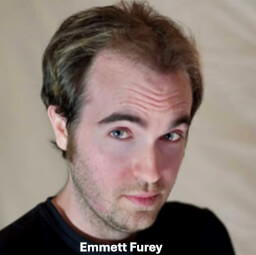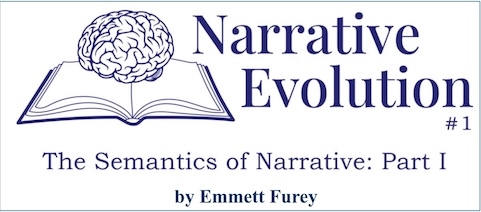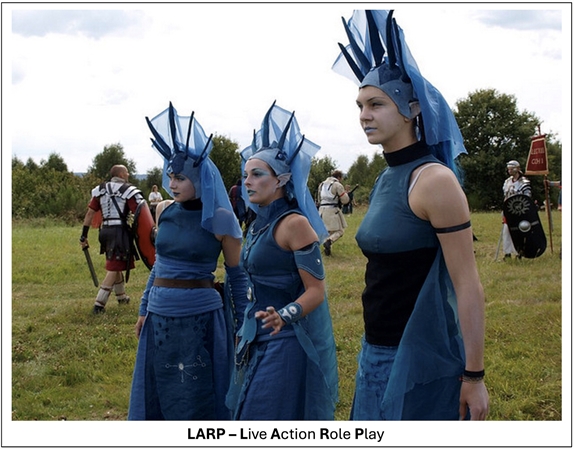Join us as we welcome writer, narrative designer, and transmedia producer Emmett Furey to Narrative Mindworks, presenting his insightful series on the evolution of storytelling and its integral role in human development. Dive into "Narrative Evolution," an exploration that delves into how our species has harnessed the power of narrative to shape our perception of the world.
 Periodically, the installment will be complemented by a video-recorded conversation with Emmett, where he expands upon his work, findings, and perspectives.
Periodically, the installment will be complemented by a video-recorded conversation with Emmett, where he expands upon his work, findings, and perspectives.
We invite you to enrich the conversation by sharing your insights, feedback, and questions. Your perspective is an essential element of our shared journey through narrative.
Let’s begin the conversation.

Over the course of my 15-year career working professionally as an interactive storyteller, I’ve cultivated a philosophy of art that I’ve dubbed narrative correlationism. Narrative correlationism posits that narrative, as we know it today, originally came about as a side-effect of the evolution of advanced conscious processing in human beings. Our consciousness, in other words, is narrative by nature, which is the reason that we experience our lives as stories. The story of our life is the first and longest story we ever experience, and, by extension, all narrative art is simply an imitation of life. With that in mind, I believe that the more thoroughly we, as artists, can understand our conscious experience of the world around us, the more impactful we can be at creating meaningful narrative experiences for our audiences.

This post marks the beginning of a series I’m calling Narrative Evolution. Narrative Evolution is meant to be an exploration of how storytelling has evolved over time, but it will also be about how we, as human beings, evolved our narrative orientation to the world. The series will explore narrative correlationism as an anti-auteur theory which suggests that the audience experience is the only one that matters. And all of this will be a preamble to a longer discussion about the participatory arts - any art form designed for the audience to be an active participant: Immersive theater, Alternate Reality games, video games, virtual reality, tabletop roleplaying games, and larp, to name just a few.

There are two thinkers whose work I have found most in keeping with the tenets of narrative correlationism: Hermeneutics Philosopher Wilhelm Dilthey and Neuroscientist Daniel Bor. Two men, interestingly enough, whose individual research was separated by nearly a century. Remarkably, Ditlhey’s work seemed expertly to describe the effects of consciousness decades before the work of cognitive researchers like Bor would lay a groundwork for explaining its causes. Dilthey observed that human consciousness is narrative in nature, and Bor put forth a theory of consciousness that could explain why that is, and how it works.

What I’m suggesting with narrative correlationism is this: If the human conscious experience is effectively synonymous with story, then it stands to reason that the study of one should be fundamentally related to the study of the other. There’s an entire, relatively nascent field of inquiry called cognitive narratology that believes likewise that understanding our conscious awareness is key to understanding narrative. Marie-Laure Ryan suggests that a true definition of narrative should “delineate the set of cognitive operations whose convergence produces the type of mental representation that we regard as a story” (1). Narrative correlationism agrees with this premise, and seeks to explore the question: What precisely is the nature of the conscious experience that we call story? And, as Ryan suggests, the best way to start that process may be to settle on a definition for the term.
Narrative correlationism defines ‘story’ as ‘meaningful connections across time.’ Philosophers, narratologists, and historians alike have been trying to unlock the elusive nature of narrative since time immemorial, to find the true meaning behind ‘meaning.’
And I believe the missing piece to that puzzle has always been a clear understanding of the neural network that produces our rich human consciousness. It is the brain that dictates how we experience the world around us, and, as well-meaning as Wilhelm Dilthey was when he explored these ideas in his Critique of Historical Reason in the early 20th century, he simply didn’t know enough about cognitive science at the time to take that train of thought all the way to the station. It is consciousness, in the final analysis, that both facilitates the creation of meaning, and ultimately determines, for each of us, what is meaningful and what isn’t. It is consciousness, by extension, that enables us to experience the world as story, and consciousness that delimits which parts of our overall life experience are relevant to that story.

Now, I want to be clear from the start that I make no claims to being a scientist, so do please take this layman’s ruminations on the origin, purpose, and nature of human consciousness with the grain of salt it deserves. What I am is an artist. Which is why, first and foremost, narrative correlationism should be considered a philosophy of art.
So, let’s begin our journey by exploring the story of humankind’s narrative evolution. We’ll examine how our narrative-worldview may have come about, and how it impacts the way we look at stories, and by extension, the way we look at ourselves. And from there, we’ll go on to examine how the stories that we live influence the stories that we tell; how narrative art came to imitate life; and how the art of storytelling itself has evolved over time.
SOURCES:
(1) Ryan, M.L. (2007). Toward a Definition of Narrative. In D. Herman (Ed.), The Cambridge Companion to Narrative (pp. 22-36). Cambridge University Press.

